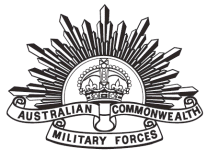

| Regimental number | 1732 |
| Place of birth | Collingwood, Victoria |
| School | Central State School, Richmond, Victoria |
| Religion | Church of England |
| Occupation | Picture framer |
| Address | 25 Ebden Street, Elsternwick, Victoria |
| Marital status | Single |
| Age at embarkation | 22 |
| Height | 5' 9.75" |
| Weight | 168 lbs |
| Next of kin | Father, Harry Harrison, 24 Ebden Street, Elsternwick, Victoria |
| Previous military service | Nil |
| Enlistment date | |
| Place of enlistment | Melbourne, Victoria |
| Rank on enlistment | Private |
| Unit name | 23rd Battalion, 2nd Reinforcement |
| AWM Embarkation Roll number | 23/40/2 |
| Embarkation details | Unit embarked from Melbourne, Victoria, on board HMAT A64 Demosthenes on |
| Rank from Nominal Roll | Lance Corporal |
| Unit from Nominal Roll | 22nd Battalion |
| Other details from Roll of Honour Circular | 'Being a playing member of the Fitzroy Football League Club and also a brilliant Junior Cricketer playing with the Fitzroy Footballers Cricket Club.' (Details from Father) |
| Fate | Killed in Action |
| Place of death or wounding | Bullecourt, France |
| Age at death | 24 |
| Age at death from cemetery records | 24 |
| Place of burial | No known grave |
| Commemoration details | Australian National Memorial, Villers-Bretonneux, France Villers-Bretonneux is a village about 15 km east of Amiens. The Memorial stands on the high ground ('Hill 104') behind the Villers-Bretonneux Military Cemetery, Fouilloy, which is about 2 km north of Villers-Bretonneux on the east side of the road to Fouilloy. The Australian National Memorial, Villers-Bretonneux is approached through the Military Cemetery, at the end of which is an open grass lawn which leads into a three-sided court. The two pavilions on the left and right are linked by the north and south walls to the back (east) wall, from which rises the focal point of the Memorial, a 105 foot tall tower, of fine ashlar. A staircase leads to an observation platform, 64 feet above the ground, from which further staircases lead to an observation room. This room contains a circular stone tablet with bronze pointers indicating the Somme villages whose names have become synonymous with battles of the Great War; other battle fields in France and Belgium in which Australians fought; and far beyond, Gallipoli and Canberra. On the three walls, which are faced with Portland stone, are the names of 10,885 Australians who were killed in France and who have no known grave. The 'blocking course' above them bears the names of the Australian Battle Honours. After the war an appeal in Australia raised £22,700, of which £12,500 came from Victorian school children, with the request that the majority of the funds be used to build a new school in Villers-Bretonneux. The boys' school opened in May 1927, and contains an inscription stating that the school was the gift of Victorian schoolchildren, twelve hundred of whose fathers are buried in the Villers-Bretonneux cemetery, with the names of many more recorded on the Memorial. Villers-Bretonneux is now twinned with Robinvale, Victoria, which has in its main square a memorial to the links between the two towns. |
| Panel number, Roll of Honour, Australian War Memorial | 96 |
| Miscellaneous information from cemetery records | Parents: Harry and Elizabeth HARRISON, 6 Rowan Street, Elsternwick, Victoria |
| Family/military connections | Brother in law: Lt H Dawson (Adjt) Aust Corps Cyclist Battalion. |
| Other details |
War service: Egypt, Gallipoli Embarked Alexandria to join the British Expeditionary Force, 30 August 1915. Wounded in action, 22 September 1915 (scalp wound); admitted same day to 6th Field Ambulance and thence to 2nd Australian Casualty Clearing Station; transferred to Mudros, 22 September 1915; to Malta, 27 September 1915, and admitted to Tigne Hospital (scalp wound and left hand); transferred to England, 26 October 1915, and admitted to Beaufort Hospital, Fishponds, 4 November 1915. Returned to Egypt, and disembarked Alexandria from Devonport, 5 March 1916; rejoined Bn, Canal Zone, 11 March 1916. Embarked Alexandria to join the British Expeditionary Force, 19 March 1916; disembarked Marseilles, France, 26 March 1916. Wounded in action, 27 July 1916 (shell shock); admitted to 4th Casualty Clearing Station, 29 July 1916; transferred to No 3 General Hospital, Boulogne, 30 July 1916; to England, 10 August 1916, and admitted to 1st Southern General Hospital, Birmingham; discharged to No 1 Command Depot, Perham Downs, 27 September 1916; granted furlough, 28 September 1916, to report to No 1 Command Depot, 16 October 1916. Proceeded overseas to France, 25 February 1917; rejoined Bn, 3 March 1917. Killed in action, 3 May 1917. Medals: 1914-15 Star, British War Medal, Victory Medal |